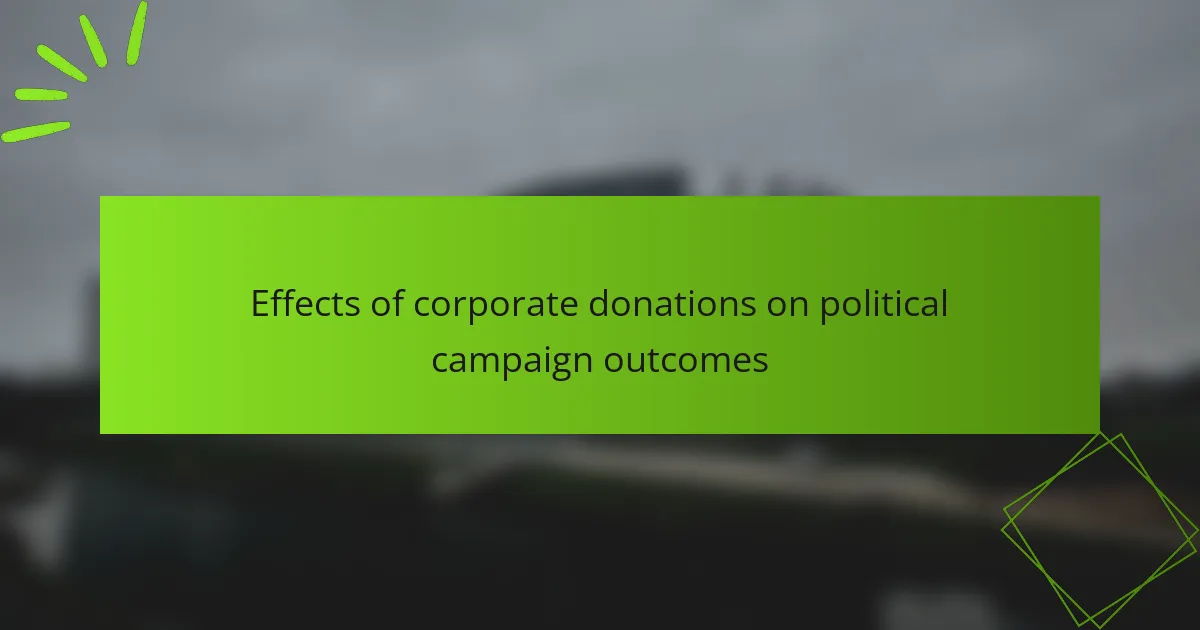Corporate donations are financial contributions made by businesses to political campaigns, significantly impacting election outcomes. These donations provide candidates with critical funding for advertising, outreach, and staffing, enhancing their visibility and competitiveness. Research indicates that candidates receiving substantial corporate contributions often secure more votes and may prioritize corporate interests over their constituents, leading to potential conflicts of interest. The article explores how corporate donations influence campaign dynamics, voter perceptions, and legislative outcomes, highlighting the implications for democracy and civic engagement.

What are the effects of corporate donations on political campaign outcomes?
Corporate donations significantly influence political campaign outcomes. They provide candidates with essential funding for advertising and outreach efforts. Increased financial resources often enhance a candidate’s visibility and competitiveness. Studies indicate that candidates receiving substantial corporate donations tend to secure more votes. For instance, research by the Center for Responsive Politics shows that candidates who receive corporate contributions often outperform their opponents in elections. Additionally, corporate donations can lead to favorable policy outcomes for the donating entities. This creates a potential conflict of interest, as elected officials may prioritize corporate interests over constituents. Overall, corporate donations play a crucial role in shaping the dynamics of political campaigns and their results.
How do corporate donations influence electoral results?
Corporate donations significantly influence electoral results by shaping candidate visibility and campaign messaging. These donations provide financial resources that enable candidates to run more extensive advertising campaigns. Increased advertising leads to greater public awareness of candidates and their platforms. Research shows that candidates with higher funding often receive more votes. For instance, a study by the Center for Responsive Politics found that candidates who outspend their opponents typically win their races. Additionally, corporate donations can sway policy positions to align with donor interests. This alignment can lead to legislative outcomes that favor corporations, further entrenching their influence in politics. Overall, the correlation between corporate funding and electoral success is well-documented and impacts democratic processes.
What role do corporate donations play in candidate visibility?
Corporate donations significantly enhance candidate visibility. These contributions often fund advertising campaigns, increasing exposure to potential voters. Candidates with substantial corporate backing can afford more media placements. This leads to higher recognition in public discourse. Studies show that candidates who receive larger donations tend to lead in polls. For example, a 2018 study by the Center for Responsive Politics found that candidates with higher corporate funding had a 20% greater chance of winning their races. Additionally, corporate donations can also facilitate access to influential networks. This further amplifies a candidate’s presence in political discussions and events. Overall, corporate donations play a crucial role in shaping candidate visibility.
How do corporate donations affect voter perception?
Corporate donations can significantly influence voter perception. Voters may view candidates receiving large donations as more favorable or legitimate. This perception can stem from the belief that corporate backing indicates a candidate’s competence and alignment with business interests. Research shows that candidates with substantial corporate funding often gain higher visibility in campaigns. A study by the Center for Responsive Politics indicates that candidates with more financial resources tend to win more elections. Additionally, voters may assume that corporate donors have shared values with the candidates they support. This can lead to increased trust and support from constituents who prioritize economic concerns. Overall, corporate donations can shape the narrative around a candidate, impacting voter attitudes and decisions.
Why do corporations invest in political campaigns?
Corporations invest in political campaigns to influence legislation and policy decisions. This investment allows them to advocate for favorable regulations and business environments. By financially supporting candidates, corporations gain access to political leaders. This access can lead to more effective lobbying efforts. Additionally, corporations aim to shape public policy that aligns with their interests. Research shows that companies often contribute to candidates who support their industry. For example, the Center for Responsive Politics indicates that corporate contributions can significantly impact election outcomes. Consequently, these investments are strategic moves to protect and enhance corporate interests.
What are the motivations behind corporate political contributions?
Corporate political contributions are motivated by the desire to influence policy and regulatory outcomes. Companies aim to gain favorable legislation or regulation that benefits their business interests. Contributions can also help build relationships with politicians and political parties. This access can lead to lobbying opportunities and direct influence on decision-making. Additionally, corporations often contribute to align with the political ideologies of candidates. This alignment can enhance their public image and brand reputation. Research indicates that companies contributing to political campaigns often see a return on investment through favorable policies. For example, a study by the Center for Responsive Politics found that businesses that donate to campaigns often receive tax breaks or regulatory advantages.
How do corporate interests align with political agendas?
Corporate interests align with political agendas primarily through financial contributions to campaigns. These donations often influence policy decisions that favor corporate goals. For instance, companies may support candidates who advocate for tax cuts or deregulation. In return, politicians may prioritize legislation that benefits their corporate donors. Research indicates that corporations with substantial political contributions tend to receive favorable treatment in legislative processes. A study by the Center for Responsive Politics found that companies investing heavily in political donations often see a significant return on investment through favorable laws. This correlation illustrates the symbiotic relationship between corporate funding and political agendas.

What are the mechanisms through which corporate donations impact campaigns?
Corporate donations impact campaigns through funding, influence, and access. Funding provides resources for advertising, outreach, and staffing. This financial support enables candidates to amplify their messages effectively. Influence occurs as corporations often seek favorable policies in return for their contributions. Access allows donors to establish relationships with candidates, facilitating dialogue on key issues. Research shows that candidates receiving significant corporate donations tend to align with donor interests. This dynamic can shift campaign priorities and voter perceptions. Studies indicate that corporate-funded campaigns often have higher visibility and voter engagement.
How do campaign finance laws regulate corporate donations?
Campaign finance laws regulate corporate donations by establishing limits on the amounts corporations can contribute to political campaigns. These laws aim to promote transparency and prevent undue influence in politics. For instance, the Federal Election Commission (FEC) enforces rules that require corporations to disclose their contributions. Additionally, some laws prohibit direct contributions from corporations to candidates. The Supreme Court’s decision in Citizens United v. FEC allowed corporations to spend unlimited amounts on independent political expenditures. However, this ruling does not change the restrictions on direct contributions. Overall, these regulations are designed to balance corporate influence with public interest in the electoral process.
What are the key regulations governing corporate political contributions?
Key regulations governing corporate political contributions include the Federal Election Campaign Act (FECA) and the Bipartisan Campaign Reform Act (BCRA). FECA regulates the financing of federal elections and prohibits corporations from making direct contributions to candidates. The BCRA, enacted in 2002, further restricts the use of soft money in federal elections. Additionally, the Supreme Court’s Citizens United v. FEC ruling in 2010 allowed corporations to spend unlimited amounts on independent political expenditures. These regulations shape how corporations engage in political funding and influence campaign outcomes.
How do these regulations vary across different jurisdictions?
Regulations on corporate donations to political campaigns vary significantly across jurisdictions. In the United States, federal law allows unlimited corporate contributions to independent expenditure committees, while some states impose strict limits on direct corporate donations to candidates. For example, California prohibits corporate contributions to candidates, whereas Texas allows them with limits. In the European Union, regulations are generally stricter, with many countries banning corporate donations altogether. Countries like Germany require transparency in corporate funding, mandating disclosures of donations above a certain threshold. These variations reflect differing political cultures and legal frameworks regarding campaign financing.
What strategies do candidates use to leverage corporate donations?
Candidates use several strategies to leverage corporate donations effectively. They often build relationships with corporate leaders to secure financial support. Networking events and personal meetings facilitate these connections. Candidates also align their campaign messages with corporate interests to attract donations. This alignment can include advocating for policies that benefit specific industries. Transparency in campaign finance can enhance trust and encourage more donations. Additionally, candidates may utilize social media to showcase their corporate supporters. This visibility can create a positive feedback loop, attracting further donations. Research indicates that campaigns with significant corporate funding often have increased visibility and voter reach.
How do candidates prioritize donor interests in their campaigns?
Candidates prioritize donor interests by aligning campaign strategies with donor expectations. This alignment often includes addressing specific policy issues that matter to donors. Candidates may tailor their messaging to resonate with the values and interests of their financial backers.
Research indicates that candidates with significant corporate donations tend to support legislation favorable to those donors. For instance, a study by the Center for Responsive Politics found that candidates receiving large donations from the energy sector often advocate for policies that benefit that industry. Additionally, candidates may offer access to decision-making processes or exclusive events to major donors.
This prioritization of donor interests can significantly influence campaign outcomes, shaping both the candidate’s platform and voter perceptions.
What are the implications of donor influence on policy decisions?
Donor influence on policy decisions can lead to biased legislation favoring specific interests. This often results in policies that prioritize donor agendas over public welfare. Research indicates that large donations can significantly sway policymakers. For instance, a study by the Center for Responsive Politics found that industries with higher political contributions often receive favorable regulations. This dynamic can undermine democratic processes and create inequalities in representation. The implications may include reduced public trust in government and increased polarization among constituents.

What are the potential consequences of corporate donations on democracy?
Corporate donations can significantly influence democracy. They often lead to unequal representation in political processes. Wealthy corporations can amplify their voices over ordinary citizens. This disparity may result in policies favoring corporate interests. Research shows that increased corporate funding correlates with legislative outcomes that benefit donors. For example, companies that contribute heavily to campaigns often receive favorable regulations. This dynamic can undermine public trust in democratic institutions. It may also discourage civic engagement among the electorate. Overall, corporate donations can distort the democratic process by prioritizing money over public interest.
How do corporate donations affect public trust in political institutions?
Corporate donations negatively affect public trust in political institutions. Such contributions can create perceptions of corruption. Citizens may believe that elected officials prioritize corporate interests over the public good. Research by the Pew Research Center shows that 75% of Americans think corporate donations lead to undue influence. This perception can diminish engagement in the political process. When trust erodes, voter turnout may decrease. Additionally, public skepticism can lead to lower approval ratings for political institutions. Overall, corporate donations can create a cycle of distrust that undermines democratic processes.
What evidence exists regarding the impact of donations on voter trust?
Research indicates that donations can significantly impact voter trust. Studies show that large donations may lead to skepticism among voters. For instance, a 2018 study by the Journal of Political Science found that voters perceive candidates who receive substantial corporate contributions as more likely to prioritize donor interests over public concerns. This perception can erode trust in the electoral process. Furthermore, surveys conducted by the Pew Research Center reveal that a majority of voters believe that campaign donations influence political decisions. This belief correlates with decreased trust in elected officials. Overall, evidence suggests that corporate donations can negatively affect voter trust in political candidates and the democratic process.
How can transparency in donations improve public perception?
Transparency in donations can significantly enhance public perception. When organizations disclose their donation sources, it fosters trust among stakeholders. Trust leads to increased credibility and a positive reputation. Studies show that transparency can boost public support by up to 30%. Clear communication about donation allocation also reassures the public about ethical practices. Organizations that are transparent are often viewed as more accountable. This accountability can lead to stronger community engagement and loyalty. Ultimately, transparency in donations aligns with public expectations for integrity and openness.
What best practices can be adopted to mitigate negative effects?
Implementing transparency in corporate donations can mitigate negative effects. Transparency allows stakeholders to understand the sources and amounts of funding. Establishing clear guidelines for donation limits reduces undue influence. Encouraging diverse funding sources prevents reliance on a single entity. Regular audits of donation practices ensure compliance with regulations. Engaging in public discourse fosters trust and accountability. Educating stakeholders about the implications of donations can promote informed decision-making. Research shows that transparency in political financing leads to increased public trust in the electoral process.
How can campaigns balance corporate contributions with ethical considerations?
Campaigns can balance corporate contributions with ethical considerations by establishing clear guidelines for accepting donations. These guidelines should prioritize transparency and accountability. Campaigns can disclose the sources and amounts of contributions publicly. This practice helps to build trust with voters. Additionally, campaigns should evaluate the alignment of corporate values with their own mission. Research indicates that transparency can positively influence public perception. For example, a study by the Center for Political Accountability found that companies that disclose political spending experience improved reputations. By implementing these strategies, campaigns can navigate the complexities of corporate funding while maintaining ethical integrity.
What role does public awareness play in shaping donation policies?
Public awareness significantly influences the development of donation policies. Increased public awareness leads to greater scrutiny of corporate donations. This scrutiny can drive policymakers to implement stricter regulations. For instance, campaigns often respond to public sentiment regarding transparency in donations. Research indicates that heightened awareness can result in legislative changes aimed at limiting corporate influence. A study by the Brennan Center for Justice found that transparency can reduce the amount of dark money in politics. Thus, public awareness serves as a catalyst for reforming donation policies to promote accountability.
The main entity of this article is corporate donations and their effects on political campaign outcomes. The article examines how corporate contributions influence candidate visibility, voter perception, and electoral results, highlighting the correlation between funding and campaign success. It discusses the motivations behind corporate donations, the mechanisms through which they impact campaigns, and the regulatory landscape governing such contributions. Additionally, the article addresses the implications of corporate donations on democracy, public trust in political institutions, and best practices for maintaining ethical standards in campaign financing.
